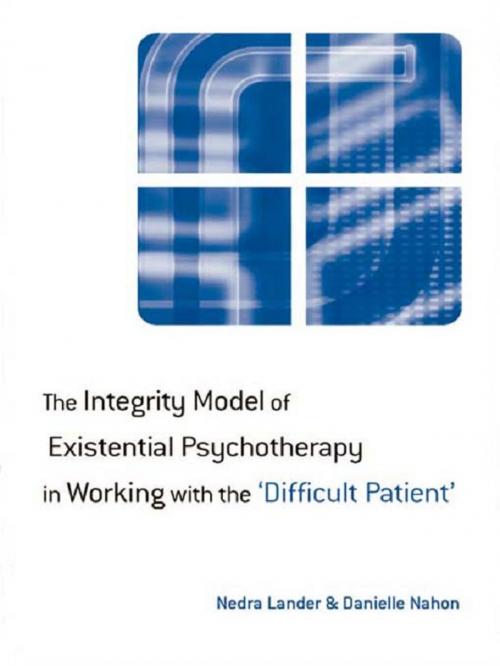The Integrity Model of Existential Psychotherapy in Working with the 'Difficult Patient'
Nonfiction, Health & Well Being, Psychology, Counselling, Psychotherapy| Author: | Nedra Lander, Danielle Nahon | ISBN: | 9781135453268 |
| Publisher: | Taylor and Francis | Publication: | May 2, 2006 |
| Imprint: | Routledge | Language: | English |
| Author: | Nedra Lander, Danielle Nahon |
| ISBN: | 9781135453268 |
| Publisher: | Taylor and Francis |
| Publication: | May 2, 2006 |
| Imprint: | Routledge |
| Language: | English |
Dealing with the therapeutic impasse is one of the most challenging tasks faced by therapists. The Integrity Model of Existential Psychotherapy in Working with the 'Difficult Patient' describes how the Integrity model of psychotherapy provides an original solution to dealing with difficult issues such as resistance, acting out, counter-transference, guilt, value clashes and cultural diversity.
The Integrity model is based on an existential approach to living and views psychological difficulties as stemming from a lack of fidelity to one's values. In this book, the authors explore how this approach to psychotherapy can enhance other therapeutic models or stand on its own to offer a valuable alternative perspective on the causes of mental illness. Case material is provided to illustrate the value of the Integrity model in relation to a range of clinical issues, including:
Borderline Personality Disorders
Antisocial Personality
Post-Traumatic Stress
Schizophrenia
Workplace Stress
Addictions.
This book provides a provocative and insightful presentation of the subject of impasses, as well as dealing with associated issues including the role of values in psychotherapy, community, spirituality, and therapist responsibility. It will be of great interest to counsellors and psychotherapists.
Dealing with the therapeutic impasse is one of the most challenging tasks faced by therapists. The Integrity Model of Existential Psychotherapy in Working with the 'Difficult Patient' describes how the Integrity model of psychotherapy provides an original solution to dealing with difficult issues such as resistance, acting out, counter-transference, guilt, value clashes and cultural diversity.
The Integrity model is based on an existential approach to living and views psychological difficulties as stemming from a lack of fidelity to one's values. In this book, the authors explore how this approach to psychotherapy can enhance other therapeutic models or stand on its own to offer a valuable alternative perspective on the causes of mental illness. Case material is provided to illustrate the value of the Integrity model in relation to a range of clinical issues, including:
Borderline Personality Disorders
Antisocial Personality
Post-Traumatic Stress
Schizophrenia
Workplace Stress
Addictions.
This book provides a provocative and insightful presentation of the subject of impasses, as well as dealing with associated issues including the role of values in psychotherapy, community, spirituality, and therapist responsibility. It will be of great interest to counsellors and psychotherapists.















